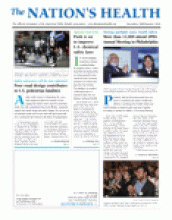In homes, communities and health care facilities around the globe, women provide the majority of health care but rarely receive the care they need, a new World Health Organization report found. And while there has been considerable progress in recent decades to improve the health of girls and women, societies fail to meet their health care needs at key moments of their lives, particularly in their teen years and in old age, the report said.
Worldwide, up to 80 percent of all health care and 90 percent of care for HIV/AIDS-related illness is provided in the home, and nearly always by women. Yet more often than not, the women’s efforts are unsupported and unrecognized, said the November WHO report, “Women and Health: Today’s Evidence, Tomorrow’s Agenda.”
“If women are denied a chance to develop their full human potential, including their potential to lead healthier and at least somewhat happier lives, is society as a whole really healthy?” asked WHO Director-general Margaret Chan, MD, MPH. “What does this say about the state of social progress in the 21st century?”
Chan called for urgent action — within the health sector as well as in homes and communities — to improve the health and lives of girls and women around the world, from birth to old age.
The report noted that some services for women, such as health care during pregnancy, are more likely to be in place than services for other conditions, such as mental health, sexual violence and cervical cancer screening and treatment. But in many countries, sexual and reproductive health services tend to focus exclusively on married women and ignore the needs of unmarried women and teens, the report said, and few services are available for marginalized groups of women such as sex workers, intravenous drug users and women who live in rural areas.
“It’s time to pay girls and women back, to make sure that they get the care and support they need to enjoy a fundamental human right at every moment of their lives,” Chan said. “That is their right to health.”
Women live longer than men, but the extra years are not always healthy ones, the report said. HIV, pregnancy-related conditions and tuberculosis continue to be major killers of women ages 15 to 45 globally. However, as women age, noncommunicable diseases such as heart disease become major causes of death and disability. Globally, heart attacks and stroke are the two leading killers of women, but heart disease in women is often underdiagnosed because women’s symptoms can differ from men’s, the report said. Women tend to develop heart disease later in life than men, and because women tend to live about six years to eight years longer than men, they represent a growing proportion of all older people.
Despite some biological advantages, however, the report noted “striking differences” in women’s health due to the varied conditions in which the live. At every age, women in high-income countries live longer and are less likely to suffer from poor health and premature death, the report said. Also, lack of access to education, decision-making positions and income may limit a woman’s ability to protect her own health and the health of her family.
“We will not see significant progress as long as women are regarded as second-class citizens in so many parts of the world,” Chan said. “In so many societies, men exercise political, social and economic control. The health sector has to be concerned. These unequal power relations translate into unequal access to health care and unequal control over health resources.”
Download the report at www.who.int/en.
- Copyright The Nation’s Health, American Public Health Association









